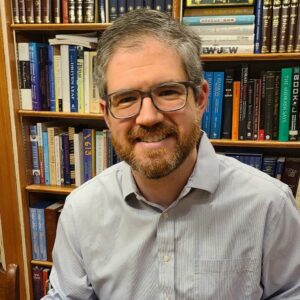
By Rabbi Alex Salzberg
Throughout the Torah, God has many names. Our tradition has taught that each name represents a different aspect of God’s divine nature and reflects the perspective from which God interacted with humanity in a particular narrative. Often overlooked, a new name for God is introduced here, one that never appears again in the Biblical text.
Hagar, Sarah’s servant, was pregnant with Abraham’s child because Abraham and Sarah had been unable to conceive. This is the first of several instances of surrogacy recorded in the Torah. However, Hagar’s pregnancy changed the family dynamic. We read that, as soon as Hagar learned that she was pregnant, “her mistress was lowered in her esteem.” Sarah felt this disrespect and brought her grievance to Abraham. Abraham, for his part, appears to have wanted to stay out of their conflict, and encouraged Sarah to do whatever she thought was best. Sarah began to treat Hagar harshly, causing Hagar to flee into the wilderness.
It was in this wilderness that a messenger of God appeared to Hagar and promised her that she would give birth to a son and through him she would be the mother of descendants too many to count — a promise with echoes of God’s covenant with Abraham. Most importantly, the messenger reassured Hagar that God heard her suffering and saw her pain.
After knowing that she was not alone, that her suffering mattered in the world, Hagar was able to return to Abraham and Sarah’s household, to continue to exist in a situation that she had previously found impossible. This is the power of feeling seen. This is the importance of knowing that others in the world care when one is in pain. Hagar was blessed to know that God saw her and cared about her, even when no other human being did. In response to this divine gift, Hagar gives God a new name, El-Ro’i, “The God Who Sees,” or perhaps “The God Who Sees Me.”
We exist in a moment, as American Jews, that reminds me of Hagar in the wilderness. We are suffering and in pain. We are scared and angry. We are hurting, and so many of the people that we hoped and expected would stand with us are nowhere to be seen. Or perhaps worse, are telling us that we have no cause to feel the way that we do.
In speaking with Jewish college students over the past weeks, they have felt very alone. They have shared with me stories of friends and faculty making insensitive or dismissive comments. They have also shared the deafening silence coming from so many of their peers. Thankfully, this experience has not been universal, there are those on campus who have offered care and support. The university administration has proactively reached out to us to express concern and practical support. But none of this is enough.
In response, Jewish students have come together in Hillel and other Jewish spaces to feel safe, but also to feel seen. They needed a community that understood what they were feeling and that shared their pain. Jewish community is always necessary, but even more so in such moments of isolation.
God saw Hagar for who she was, in all her complexity. That sense of real relationship was able to carry her through years of isolation and distress. There is a long road ahead for the Jewish people around the world. It is not one that we can travel alone. We must journey with one another. We hope to journey with allies who see and honor us for who we are. We can also be comforted by the knowledge that, like Hagar, we journey with “The God Who Sees.”
Rabbi Alex Salzberg is a Baltimore native and a graduate of Krieger Schechter Day School and Pikesville High School. He has a master’s degree from Towson University and is the executive director of Towson University Hillel.





